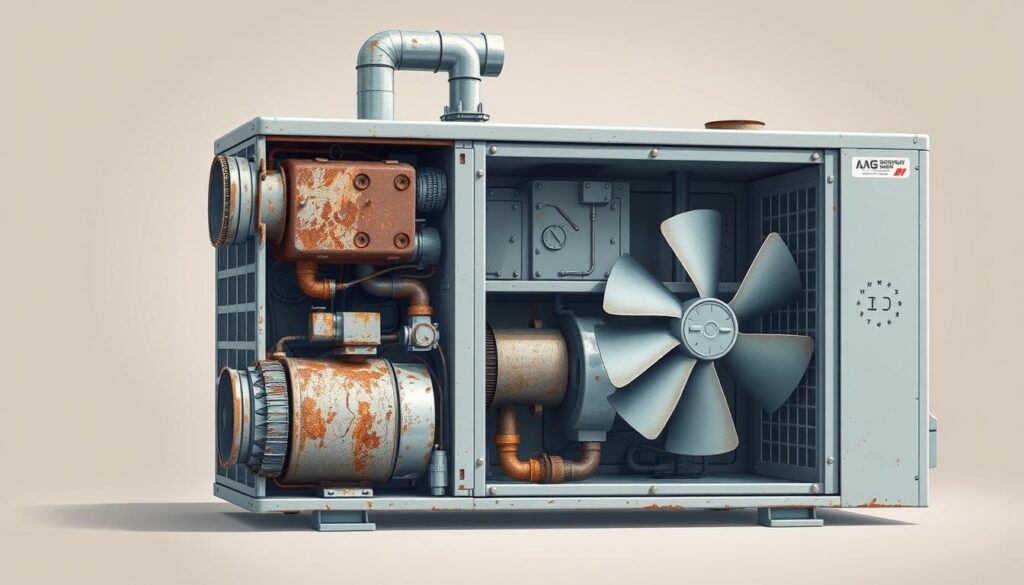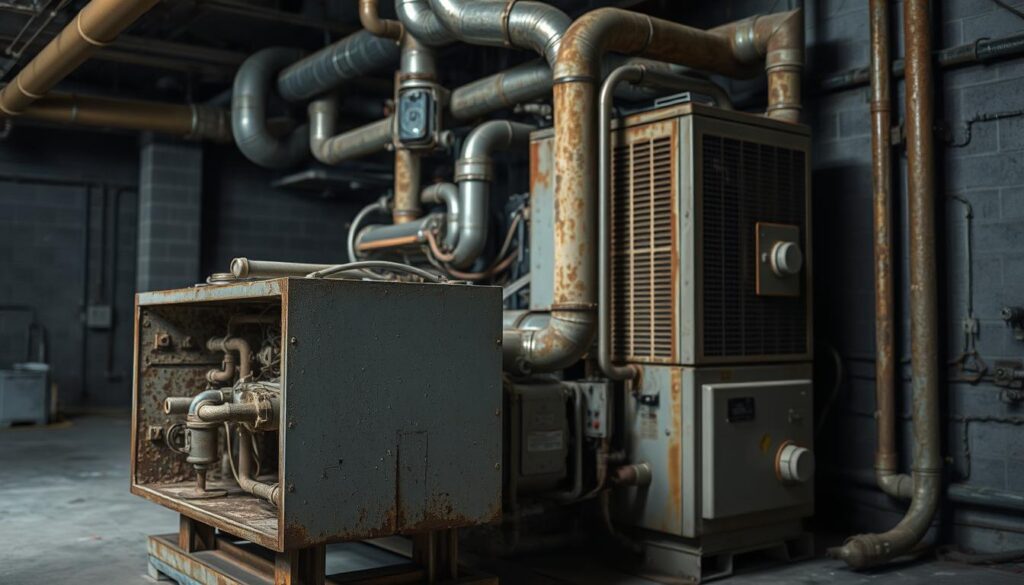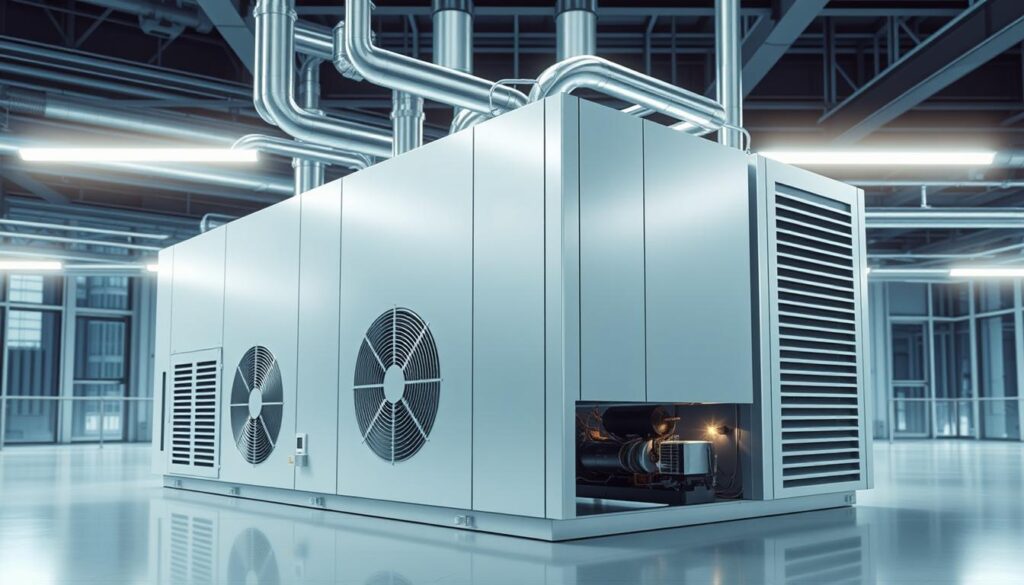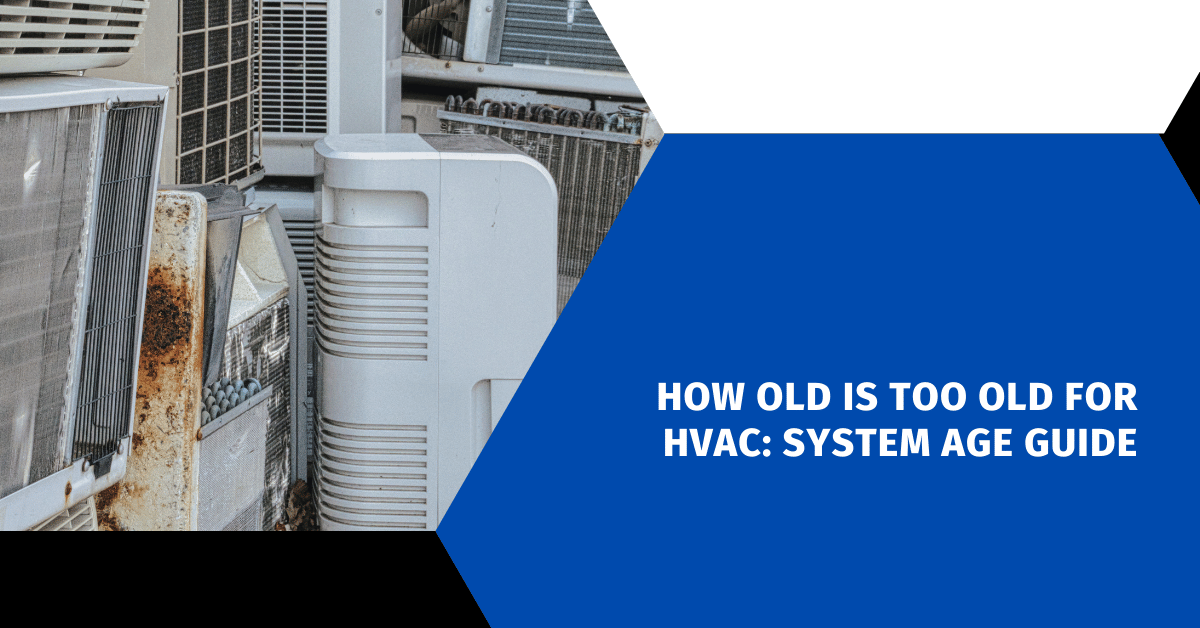Affiliate Disclosure
HVAC Guide Guys is a participant in the Amazon Services LLC Associates Program, an affiliate advertising program designed to provide a means for sites to earn advertising fees by advertising and linking to Amazon.
How Old Is Too Old For HVAC? Is your home’s heating and cooling system secretly draining your wallet and comfort? Knowing how long your HVAC system lasts can save you thousands. It helps avoid unexpected repair costs and energy waste.

Many homeowners ignore the signs that their HVAC system is getting old. Most furnaces last about 15 years. But, some keep working long after they should, posing risks to performance and your wallet.
To know if your HVAC system is too old, look for signs of its health and efficiency. This guide will help you understand when it’s time to replace your HVAC. It ensures your home stays comfortable and energy-efficient.
Key Takeaways
- HVAC systems typically last 15-20 years
- Regular maintenance extends system lifespan
- Age impacts energy efficiency dramatically
- Older systems cost more to operate
- Professional assessment is key for replacement decisions
Table of Contents
Understanding HVAC System Lifespan Basics
Your HVAC system is key to your home’s comfort. Knowing how long it lasts helps you decide on upkeep and when to replace it. Most home HVAC systems work for 10 to 15 years. But, this can change based on several important factors.
Different parts of your HVAC system last for different times. Here’s a quick look at what you can expect:
- Air Conditioners: 10-15 years
- Furnaces: 15-20 years
- Heat Pumps: 10-15 years
- Boilers: 15-20 years
Factors Influencing HVAC Longevity
Several things affect how long your HVAC system lasts. These include:
- How well it was installed
- How often you use it
- Your local weather
- How well you maintain it
Maintenance: The Lifeline of Your HVAC
Regular maintenance is key to making your HVAC last longer. Getting it checked every year, changing filters, and fixing issues quickly keeps it running smoothly. This can extend its life far beyond what’s expected.
Proactive maintenance is always cheaper than emergency replacements.
By grasping these basic HVAC lifespan facts, you can keep your home comfortable and save money.
Explore Our HVAC Shop
Looking for top-rated HVAC tools, parts, and accessories? Visit our shop and find the perfect solution for your needs.
Visit the ShopSigns Your HVAC System Is Reaching End of Life
Knowing when your HVAC system is getting old can prevent sudden failures and expensive fixes. As your HVAC unit gets older, certain signs show it’s time for a new one.
Your system’s performance is a clear indicator of its health. Look out for these important signs that your HVAC is aging:
- Inconsistent temperature throughout your home
- Unusual grinding or rattling noises during operation
- Frequent cycling on and off
- Rising energy bills without changes in usage
- Visible rust or corrosion on system components
Understanding these signals helps you decide on repairs or a new system. Older systems use more energy and cost more to maintain.
| System Age | Performance Indicators | Recommended Action |
|---|---|---|
| 10-15 years | Minor performance issues | Consider professional inspection |
| 15-20 years | Significant efficiency decline | Evaluate replacement options |
| 20+ years | Frequent breakdowns | Immediate replacement recommended |
Pro tip: Regular maintenance can extend your HVAC’s life. But, replacing it is often cheaper than constant repairs.
How Old Is Too Old For HVAC: Age Thresholds Explained
Knowing when your HVAC system is getting old can help avoid costly repairs. The age of your system is key in deciding whether to fix or replace it.
Understanding when it’s time to replace your HVAC is important. Experts say to watch your system’s age and how well it works.
15-Year Benchmark for Replacement
The 15-year mark is a big deal for HVAC systems. At this age, your system might show signs of wear and drop in efficiency. Look out for:
- Higher energy bills
- More repairs needed
- Unstable temperatures
- Less cooling or heating
20-Year Maximum Age Considerations
When your HVAC hits 20 years, it’s likely time for a new one. Older systems lose efficiency and reliability fast. Here’s a comparison:
| System Age | Efficiency | Repair Costs | Recommended Action |
|---|---|---|---|
| 0-10 Years | High | Low | Maintain |
| 10-15 Years | Medium | Moderate | Monitor |
| 15-20 Years | Low | High | Consider Replacement |
| 20+ Years | Very Low | Extremely High | Replace Immediately |
Emergency Replacement Indicators
Some issues mean you need a new HVAC right away. Red flags include:
- Cracked heat exchanger
- Major refrigerant leaks
- Complete system failure
- Repeated expensive repairs
Your home’s comfort and safety depend on a good HVAC system. Regular checks and timely replacements can prevent problems and keep your system running well.
Explore Our HVAC Shop
Looking for top-rated HVAC tools, parts, and accessories? Visit our shop and find the perfect solution for your needs.
Visit the ShopEfficiency Decline in Aging HVAC Systems

As your HVAC system gets older, it loses efficiency fast. The wear and tear on parts can make it work less well. This means it uses more energy and costs more to run.
Several key factors contribute to the efficiency decline in aging HVAC equipment:
- Mechanical component degradation
- Outdated technological capabilities
- Reduced refrigerant effectiveness
- Accumulated dust and debris in critical system areas
By the time your system is 10-15 years old, it’s likely outdated. New systems use up to 40% less energy than old ones. So, your old system works harder and uses more energy to keep you comfortable.
The cost of an inefficient system adds up. It can make your energy bills much higher. Experts say to check your system’s performance often to spot efficiency drops. Watching how much energy it uses can help you decide when it’s cheaper to replace it than fix it.
An older HVAC system doesn’t just cost more to run—it compromises your home’s comfort and energy efficiency.
Knowing how age affects HVAC efficiency helps you decide what to do with your system. Keeping it up can slow down its decline. But, getting a new system is often the best choice in the long run.
Cost Analysis: Repair vs. Replace Older Units
Choosing between repairing or replacing your old HVAC system is tough. The age of your HVAC system is key in deciding what’s best for your wallet. Knowing the costs helps you choose wisely for your home’s comfort and your budget.
Repair Cost Thresholds
When thinking about your HVAC’s future, keep these repair cost tips in mind:
- If fixing your system costs more than half of a new one, it’s better to replace it
- Spending over $500 on repairs means it’s time for a new unit
- Think about your system’s age when deciding on repairs
Long-term Financial Impact
Your HVAC’s age and efficiency affect your long-term costs. Older systems need more repairs and use more energy, raising your bills. A new HVAC system offers big savings:
- Less money for maintenance
- Lower energy bills
- Better home comfort
- Maybe tax credits or rebates
Energy Bill Considerations
Modern HVAC systems can cut energy bills by 20-40%. Older units lose efficiency, making replacement a smart move. Compare your current energy costs with what a new, efficient system could save you.
Getting a new HVAC system is not just an expense. It’s a smart financial choice for your home’s comfort and value.
Explore Our HVAC Shop
Looking for top-rated HVAC tools, parts, and accessories? Visit our shop and find the perfect solution for your needs.
Visit the ShopModern HVAC Technology Advancements

The HVAC world has changed a lot in recent years. It now has systems that are more efficient and last longer. These new systems bring comfort, efficiency, and smart home features that were once dreams.
Today’s HVAC tech tackles old problems like energy waste and outdated systems. It brings new features that make homes more comfortable. Some of these include:
- Variable-speed motors that adjust cooling and heating precisely
- Multi-stage systems providing consistent temperature control
- Advanced air filtration technologies eliminating microscopic pollutants
- Smart thermostats enabling remote climate management
Now, HVAC systems can talk to each other and to us. They share important info and help save energy. With Wi-Fi and smart tech, we can control our homes like never before.
New HVAC systems are all about saving energy. Some are so good, they use up to 50% less energy than old ones. This means big savings for us and the planet.
“Technology is transforming HVAC from a simple heating and cooling solution to a complete home comfort system.” – HVAC Industry Expert
Choosing modern HVAC means better comfort, energy savings, and lasting performance. It’s a smart choice for your home.
Determining Your HVAC System’s Age
It’s important to know how old your HVAC system is. This helps keep it running well and plan for when it might need to be replaced. Knowing when it’s too old can prevent sudden breakdowns and expensive fixes.
There are a few ways to find out how old your HVAC unit is. Most systems last between 15-20 years. So, it’s key to know its exact age for the best care.
Locating the Manufacturing Date
Look for a nameplate or data sticker on your HVAC system. It usually has important details about when it was made. Here are some places to look:
- Outside condensing unit
- Indoor air handler
- Furnace interior panel
Serial Number Interpretation
The serial number can tell you exactly when your system was made. But, different makers use different codes:
| Manufacturer | Serial Number Format | Age Identification Method |
|---|---|---|
| Carrier | Week/Year Code | First two digits indicate manufacturing week/year |
| Trane | Alpha-Numeric Code | Letter represents manufacturing year |
| Lennox | Numeric Sequence | First four digits show manufacturing date |
“Knowing your HVAC system’s age is the first step in proactive home maintenance.” – HVAC Professional
Pro tip: When in doubt, contact the manufacturer directly with your serial number for precise age verification.
Benefits of Upgrading an Aging System
Upgrading your old HVAC system brings many benefits. It’s not just about controlling the temperature. Homeowners can enjoy better comfort, save on energy, and get a more efficient system.
Your old HVAC system uses a lot of energy. This means higher bills. New systems use less energy and keep your home at the perfect temperature.
- Improved Energy Efficiency: Newer systems consume less electricity
- Reduced Repair Costs: Minimized maintenance expenses
- Enhanced Indoor Air Quality: Advanced filtration technologies
- Consistent Temperature Control: More precise heating and cooling
Knowing about hvac efficiency and age helps you decide. Systems over 15 years old don’t work as well. Replacing them can save you money in the long run.
| System Age | Efficiency Level | Estimated Annual Savings |
|---|---|---|
| 10-15 Years | Moderate Decline | $100-$250 |
| 15-20 Years | Significant Decline | $250-$500 |
| 20+ Years | Critical Inefficiency | $500+ |
Getting a new HVAC system makes your home more comfortable. It can also increase your home’s value. Buyers like homes with modern, efficient heating and cooling.
Environmental Impact of Older HVAC Units
Your old HVAC system does more than just affect your home’s comfort. It also has a big impact on the environment. As older units become less common, it’s important to know how they affect our planet.
Old HVAC systems use a lot of energy and have outdated refrigerants. These can harm the environment. The age and efficiency of your system play a big role in its environmental impact.
- Outdated refrigerants contribute to ozone layer depletion
- Increased energy consumption leads to higher carbon emissions
- Inefficient systems waste substantial electrical resources
New HVAC technologies are better for the environment. New systems use eco-friendly refrigerants and are much more energy efficient. Upgrading can cut down your carbon footprint and lower your utility bills.
Replacing an old HVAC system isn’t just about comfort—it’s about environmental responsibility.
When you think about old HVAC systems, remember they harm the environment. Choosing to upgrade can help reduce greenhouse gas emissions. It supports living in a more sustainable way.
Explore Our HVAC Shop
Looking for top-rated HVAC tools, parts, and accessories? Visit our shop and find the perfect solution for your needs.
Visit the ShopPeace of Mind With New HVAC Installation
Getting a new HVAC system is more than just controlling the temperature. It’s about making your home a comfortable and reliable place. The right time to replace your HVAC can turn your home into a cozy sanctuary.
A new HVAC system means no more worrying about sudden breakdowns. You’ll get consistent performance, even in extreme weather. Modern systems last longer and work better than old ones.
- Guaranteed performance during peak seasons
- Reduced risk of sudden system failures
- Enhanced home comfort and temperature control
- Improved energy efficiency
Today’s HVAC systems come with long warranties, giving you extra peace of mind. You’ll spend less on repairs and enjoy a more stable home environment. Knowing your system won’t fail when you need it most is priceless.
Your home should be a place of comfort, not constant mechanical uncertainty.
Choosing a new HVAC system at the right time is a smart investment in your family’s comfort. Switching from an old, unreliable unit to a modern, efficient one is refreshing.
Conclusion
Knowing when your HVAC system is too old is key to a comfy and efficient home. The lifespan of your HVAC depends on many things like maintenance, how much you use it, and the environment. Getting regular checks from pros can tell you when it’s time for a new one.
Age is a big factor in how well your HVAC works. Most systems start to lose steam after 15 years. This can lead to big drops in efficiency and higher repair costs. Keeping an eye on your system can prevent sudden failures and expensive fixes.
Getting a new HVAC system is more than just about being cozy. It’s also a wise money move. New systems use less energy, cut down on bills, and make your home more comfortable. HVAC experts can guide you on the best upgrade for your home.
Don’t wait until your system completely breaks down. Book a detailed HVAC check-up today. Your home’s comfort, energy use, and savings over time depend on smart choices about your heating and cooling.

